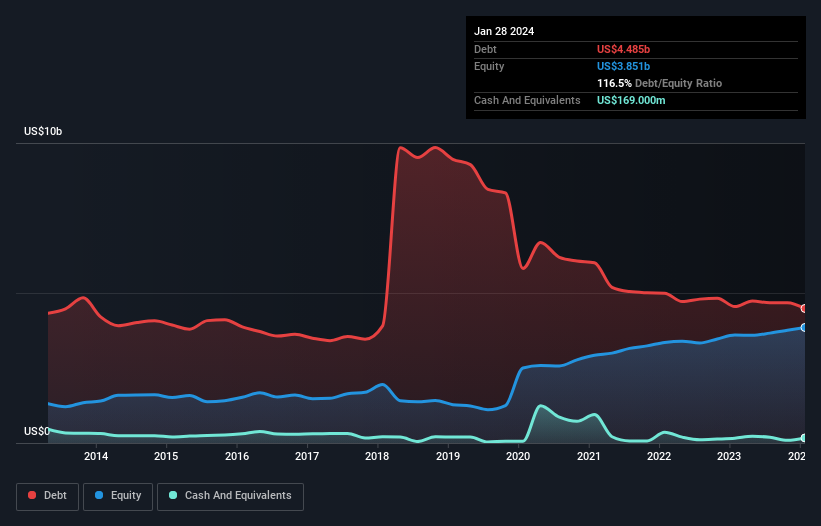
Legendary fund manager Li Lu (who Charlie Munger backed) once said, 'The biggest investment risk is not the volatility of prices, but whether you will suffer a permanent loss of capital.' When we think about how risky a company is, we always like to look at its use of debt, since debt overload can lead to ruin. As with many other companies Campbell Soup Company (NYSE:CPB) makes use of debt. But should shareholders be worried about its use of debt?
Why Does Debt Bring Risk?
Debt and other liabilities become risky for a business when it cannot easily fulfill those obligations, either with free cash flow or by raising capital at an attractive price. If things get really bad, the lenders can take control of the business. While that is not too common, we often do see indebted companies permanently diluting shareholders because lenders force them to raise capital at a distressed price. By replacing dilution, though, debt can be an extremely good tool for businesses that need capital to invest in growth at high rates of return. The first step when considering a company's debt levels is to consider its cash and debt together.
See our latest analysis for Campbell Soup
What Is Campbell Soup's Net Debt?
The chart below, which you can click on for greater detail, shows that Campbell Soup had US$4.49b in debt in January 2024; about the same as the year before. However, because it has a cash reserve of US$169.0m, its net debt is less, at about US$4.32b.

A Look At Campbell Soup's Liabilities
The latest balance sheet data shows that Campbell Soup had liabilities of US$2.06b due within a year, and liabilities of US$6.20b falling due after that. On the other hand, it had cash of US$169.0m and US$635.0m worth of receivables due within a year. So its liabilities outweigh the sum of its cash and (near-term) receivables by US$7.45b.
While this might seem like a lot, it is not so bad since Campbell Soup has a huge market capitalization of US$12.9b, and so it could probably strengthen its balance sheet by raising capital if it needed to. But we definitely want to keep our eyes open to indications that its debt is bringing too much risk.
We use two main ratios to inform us about debt levels relative to earnings. The first is net debt divided by earnings before interest, tax, depreciation, and amortization (EBITDA), while the second is how many times its earnings before interest and tax (EBIT) covers its interest expense (or its interest cover, for short). Thus we consider debt relative to earnings both with and without depreciation and amortization expenses.
Campbell Soup's net debt of 2.5 times EBITDA suggests graceful use of debt. And the alluring interest cover (EBIT of 7.3 times interest expense) certainly does not do anything to dispel this impression. Campbell Soup grew its EBIT by 4.2% in the last year. That's far from incredible but it is a good thing, when it comes to paying off debt. The balance sheet is clearly the area to focus on when you are analysing debt. But ultimately the future profitability of the business will decide if Campbell Soup can strengthen its balance sheet over time. So if you want to see what the professionals think, you might find this free report on analyst profit forecasts to be interesting.
Finally, while the tax-man may adore accounting profits, lenders only accept cold hard cash. So we clearly need to look at whether that EBIT is leading to corresponding free cash flow. During the last three years, Campbell Soup produced sturdy free cash flow equating to 59% of its EBIT, about what we'd expect. This cold hard cash means it can reduce its debt when it wants to.
Our View
Both Campbell Soup's ability to to convert EBIT to free cash flow and its interest cover gave us comfort that it can handle its debt. On the other hand, its level of total liabilities makes us a little less comfortable about its debt. When we consider all the factors mentioned above, we do feel a bit cautious about Campbell Soup's use of debt. While we appreciate debt can enhance returns on equity, we'd suggest that shareholders keep close watch on its debt levels, lest they increase. The balance sheet is clearly the area to focus on when you are analysing debt. However, not all investment risk resides within the balance sheet - far from it. For example - Campbell Soup has 1 warning sign we think you should be aware of.
If you're interested in investing in businesses that can grow profits without the burden of debt, then check out this free list of growing businesses that have net cash on the balance sheet.
New: AI Stock Screener & Alerts
Our new AI Stock Screener scans the market every day to uncover opportunities.
• Dividend Powerhouses (3%+ Yield)
• Undervalued Small Caps with Insider Buying
• High growth Tech and AI Companies
Or build your own from over 50 metrics.
Have feedback on this article? Concerned about the content? Get in touch with us directly. Alternatively, email editorial-team (at) simplywallst.com.
This article by Simply Wall St is general in nature. We provide commentary based on historical data and analyst forecasts only using an unbiased methodology and our articles are not intended to be financial advice. It does not constitute a recommendation to buy or sell any stock, and does not take account of your objectives, or your financial situation. We aim to bring you long-term focused analysis driven by fundamental data. Note that our analysis may not factor in the latest price-sensitive company announcements or qualitative material. Simply Wall St has no position in any stocks mentioned.
About NasdaqGS:CPB
Campbell's
Manufactures and markets food and beverage products in the United States and internationally.
Established dividend payer and fair value.
Similar Companies
Market Insights
Community Narratives



